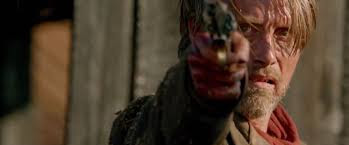The western genre is as vast in adventure and blunt-edged drama as any science-fiction and/or dark fantasy, even comparable to those spirited tales of knights and space rangers old and new. Still, not all fans are apt to leap among the categories, but there are those occasional entries that have crossover appeal. On this basis, I'm boldly going out on a limb and reviewing Kristian Levring's auspicious "The Salvation".
Just on the grounds of its cast, the film ought to catch the attention of imagi-movie lovers. It stars Mads Mikkelsen ("Hannibal"); Jeffrey Dean Morgan ("Watchmen"); Jonathan Pryce ("Something Wicked This Way Comes") and Eva Green ("Penny Dreadful"). Also, its air of austerity places it alongside "Mad Max", with hints of sadism one would likely find in a "Texas Chainsaw Massacre" entry. However, its longest roots reside in the lonesome "High Noon", the embittered "High Plains Drifter" and the gritty films of Sergio Leone, hammered hard with Steve Ditko's clear-cut divide between good and bad.
Written by Levring and Anders Thomas Jensen, "Salvation" centers on Danish ex-soldier/immigrant, Jon Jensen (Mikkelsen), who along with his wife and son is attacked by a couple cretins on a stagecoach ride to their new home. His wife is raped, and she and their son later murdered by the fiends. Jon hunts the men down and kills them; then returns to his family's once intended abode to mourn.
What Jon doesn't realize is that one of the slain men is, in fact, the brother of land baron Colonel Henry Delarue (Morgan), who (in addition to taxing folks of Black Creek for imaginary protection) demands revenge. Initially, he blames the timid townsfolk, including the undertaker/mayor, Nathan Keane (Pryce) for the events (whatever they might possibly be) that led to his brother's death. This leads to three of their own being chosen for sacrifice, including a legless man and a grandmother who runs the general store. Delarue shoots each, but acknowledges the desperate charade and insists that the actual "culprit" be uncovered, or else...
Soon thereafter, Jon and his bother, Peter (Mikael Persbrandt) head to town, with Jon intent on selling his land back to Keane. The mayor agrees to pay him, but no sooner is the deal sealed that Jon is pinpointed and along with his brother, tracked and imprisoned.
Delarue decides to torture Jon, who bravely claims his act of vengeance, and from there the poor man endures a frightening plight, assaulted by Delarue's henchman (Eric Cantona) and eventually placed on Christ-like display in the blazing sun. Also, as an ugly warm-up to these horrid circumstances, he's accused of having been too harsh on the men he killed. This preposterous blame adds to Jon's sad fate, but also increases our yearning for justice through his anguished eyes.
While Jon suffers, Delarue has his way with his brother's widow, Madelaine/"the Princess" (Eva Greene), who's position on the proceedings remains initially vague, since her tongue was severed by Indians years prior. Her pained glances, however, imply a possible disdain for Delarue and a need to flee before things worsen.
Meanwhile, the resilient Jon escapes with Peter's help, and though they face recapture and more loss, Jon finds the fortitude to take the law once more into his hands, administering it without mercy or remorse. This is the only way he can find peace of mind, and if he can settle the score, perhaps a chance at personal salvation.
On the surface, Levring's movie may appear a simple, revenge tale, or as it progresses, an essay on the consequences of greed. Indeed, avarice is a catalyst in this story, for we learn that the town is stationed over a precious commodity, only clarified at the movie's end: a motivating factor for Delarue and the behind-closed-doors big-shots who employ him.
However, there's more to the ensuing villainy than just that: the greater evil being the way the townsfolk quiver to the point of hurting their own, becoming as selfish as the primary evil-doers for the sake of self-preservation. Though they work together in their misguided cause, they also look out for number one and thus add to the chaos. This pathetic defense characterizes the town's puppet leaders, including Keane and even the preacher-man Sheriff Mallick (Douglas Henshall), who falls in line with Delarue's every, unjustified whim.
The profuse lack of morality and indifference makes the town similar to those of "High Noon" and "High Plains Drifter". As in those classic westerns, the citizenry creates its own private hell, by shirking responsibility and letting its people perish.
This also makes "Salvation" an excessively dark, brooding western. but also comparable to those adventures featuring the lurid likes of the Dark Knight and Punisher. To reinforce this angle, the shades of gray are cast far to the wayside, growing nonexistent as the climax stirs. The film's dusty, foreboding atmosphere reinforces the latter, thanks to Jens Schlosser's photography and Kasper Winding's haunting score.
However, what really makes "Salvation" tick is its superb acting: Mikkelsen giving a slow-burn woefulness on a par with his award-winning "The Hunt", and Morgan rivals his famous "Watchmen" character, Comedian, with unapologetic callousness. Green, Henshaw, Persbrandt and Pryce are also impressive, giving subdued but nuanced performances that inject realism into the rising disquiet.
"Salvation" is a rough, piercing film, but its fierceness paves a potential path for future adventure films. Imagine the upcoming Boba Fett outing opting for such dark ilk, or a "Star Trek" movie soaring into such uncompromising depths. With that said, "Salvation" is as rare as it's familiar: its execution hard, refreshing and regardless of the potential genre, ripe for emulation.
















No comments:
Post a Comment